Fiat Tipo Wagon vs Jeep Avenger – Differences & prices compared
Compare performance, boot space, consumption and price in one view.
Find out now: which car is the better choice for you – Fiat Tipo Wagon or Jeep Avenger?
The Fiat Tipo Wagon (Estate) comes with a Petrol MHEV or Diesel engine and Automatic or Manuel transmission. In comparison, the Jeep Avenger (SUV) features a Electric, Petrol or Petrol MHEV engine with Automatic or Manuel transmission.
When it comes to boot capacity, the Fiat Tipo Wagon offers 550 L, while the Jeep Avenger provides 380 L – depending on how much space you need. If you’re looking for more power, decide whether the 130 HP of the Fiat Tipo Wagon or the 156 HP of the Jeep Avenger suits your needs better.
In terms of consumption, the values are 4.70 L per 100 km for the Fiat Tipo Wagon, and 15.50 kWh4.90 L for the Jeep Avenger.
Price-wise, the Fiat Tipo Wagon starts at 21000 £, while the Jeep Avenger is available from 21900 £. Compare all the details and find out which model fits your lifestyle best!
Fiat Tipo Wagon
The Fiat Tipo Station Wagon offers a spacious and practical solution for families seeking value without sacrificing comfort. Its sleek design and modern interior features create a pleasant driving experience, complemented by a range of user-friendly technology. On the road, the Tipo Estate provides a smooth drive, making it an ideal companion for both urban and longer journeys.
details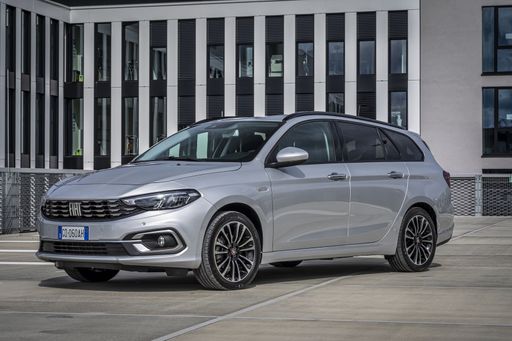 @ media.stellantis.com
@ media.stellantis.com
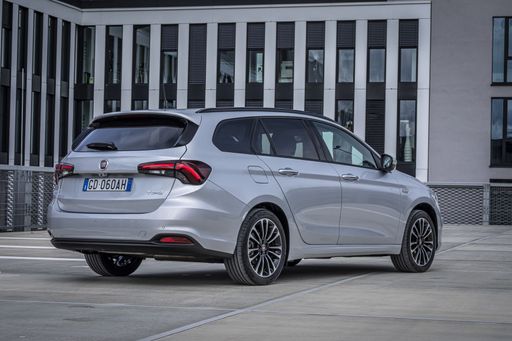 @ media.stellantis.com
@ media.stellantis.com
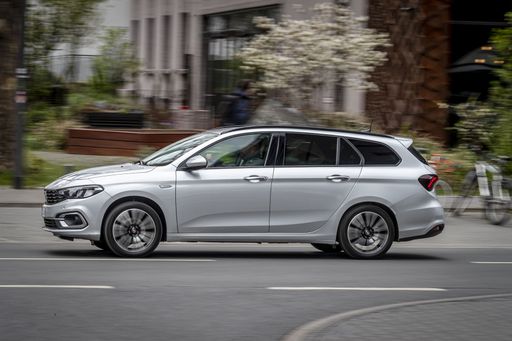 @ media.stellantis.com
@ media.stellantis.com
Jeep Avenger
The Jeep Avenger is a compact SUV that brings a blend of rugged design and modern technology, making it ideal for both urban and off-road adventures. Its robust build and distinctive styling capture Jeep's iconic spirit while offering a comfortable and refined driving experience. With advanced safety features and a versatile interior, the Avenger caters to a wide range of drivers looking for practicality and excitement.
details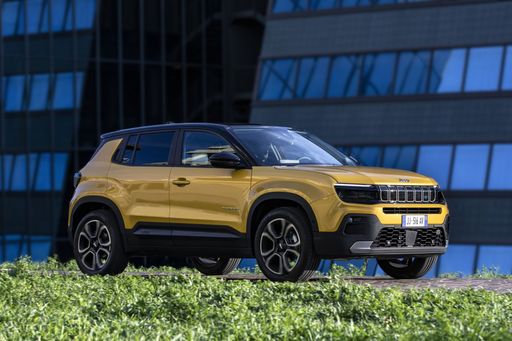 @ Stellantis
@ Stellantis
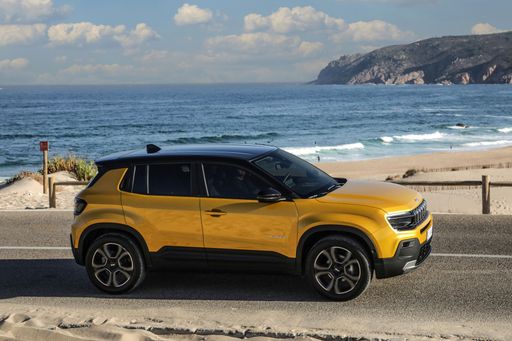 @ Stellantis
@ Stellantis
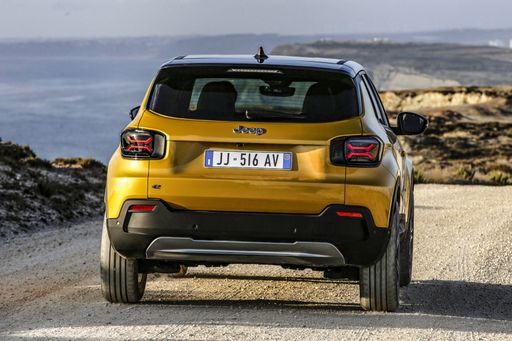 @ Stellantis
@ Stellantis
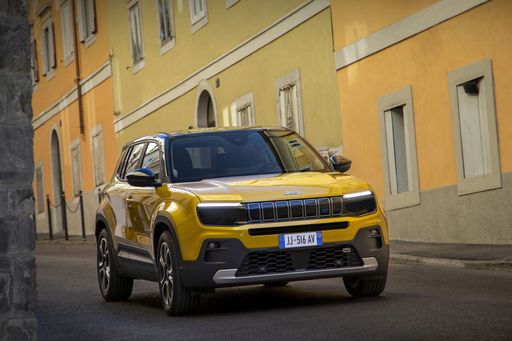 @ Stellantis
@ Stellantis
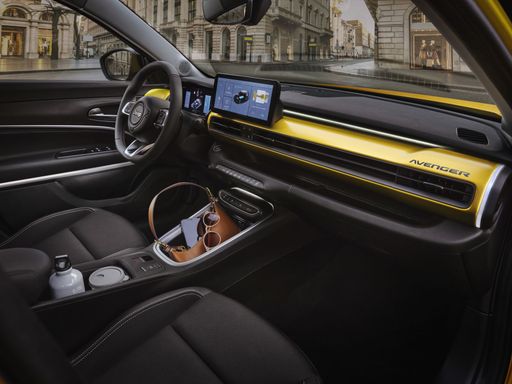 @ Stellantis
@ Stellantis

|

|
|
|
|
Costs and Consumption |
|
|---|---|
|
Price
21000 - 27000 £
|
Price
21900 - 36900 £
|
|
Consumption L/100km
4.7 - 5.4 L
|
Consumption L/100km
4.9 - 5.7 L
|
|
Consumption kWh/100km
-
|
Consumption kWh/100km
15.50 kWh
|
|
Electric Range
-
|
Electric Range
400 km
|
|
Battery Capacity
-
|
Battery Capacity
51 kWh
|
|
co2
122 - 125 g/km
|
co2
0 - 129 g/km
|
|
Fuel tank capacity
50 L
|
Fuel tank capacity
44 L
|
Dimensions and Body |
|
|---|---|
|
Body Type
Estate
|
Body Type
SUV
|
|
Seats
5
|
Seats
5
|
|
Doors
5
|
Doors
5
|
|
Curb weight
1455 - 1470 kg
|
Curb weight
1180 - 1520 kg
|
|
Trunk capacity
550 L
|
Trunk capacity
325 - 380 L
|
|
Length
4571 mm
|
Length
4084 - 4088 mm
|
|
Width
1792 mm
|
Width
1776 mm
|
|
Height
1514 mm
|
Height
1527 - 1541 mm
|
|
Payload
475 kg
|
Payload
494 - 502 kg
|
Engine and Performance |
|
|---|---|
|
Engine Type
Petrol MHEV, Diesel
|
Engine Type
Electric, Petrol, Petrol MHEV
|
|
Transmission
Automatic, Manuel
|
Transmission
Automatic, Manuel
|
|
Transmission Detail
Dual-Clutch Automatic, Manual Gearbox
|
Transmission Detail
Manual Gearbox, Dual-Clutch Automatic
|
|
Drive Type
Front-Wheel Drive
|
Drive Type
Front-Wheel Drive, All-Wheel Drive
|
|
Power HP
130 HP
|
Power HP
100 - 156 HP
|
|
Acceleration 0-100km/h
9.1 - 10.1 s
|
Acceleration 0-100km/h
9 - 10.6 s
|
|
Max Speed
206 - 207 km/h
|
Max Speed
150 - 194 km/h
|
|
Torque
240 - 320 Nm
|
Torque
205 - 260 Nm
|
|
Number of Cylinders
4
|
Number of Cylinders
3
|
|
Power kW
96 kW
|
Power kW
74 - 115 kW
|
|
Engine capacity
1469 - 1598 cm3
|
Engine capacity
1199 cm3
|
General |
|
|---|---|
|
Model Year
2024
|
Model Year
2023 - 2025
|
|
CO2 Efficiency Class
D
|
CO2 Efficiency Class
A, D, C
|
|
Brand
Fiat
|
Brand
Jeep
|
Fiat Tipo Wagon
Introduction to the Fiat Tipo Station Wagon
The Fiat Tipo Station Wagon has long been a staple in the automotive world, celebrated for its practical design, spacious interior, and affordability. The 2024 model continues this tradition, offering impressive updates in technology and performance, making it a significant contender in the compact estate car market. Here, we take a closer look at what makes the Fiat Tipo Kombi a standout choice.
Engine and Performance
Under the bonnet, the Fiat Tipo Station Wagon showcases its versatility with a choice of powertrains. Its offerings include a 1.5 GSE Hybrid with a mild-hybrid system that enhances fuel efficiency and provides a responsive driving experience. This engine choice delivers 130 PS and achieves a commendable fuel consumption rate of 5.4 L/100km.
For diesel enthusiasts, the 1.6 MultiJet engine provides a robust performance with the same 130 PS but boasts an even lower fuel consumption of 4.7 L/100km. Both engine variants offer a front-wheel drive system which is complemented by either a dual-clutch automatic transmission or a traditional manual gearbox, ensuring a pleasurable driving experience tailored to individual preferences.
Advanced Technology and Innovations
The 2024 Fiat Tipo Station Wagon is equipped with a suite of modern technologies, enhancing both safety and convenience. The model features an advanced infotainment system that integrates seamlessly with smartphones, offering navigation, media, and communication tools via a sleek and intuitive touchscreen interface.
On the safety front, the Tipo Station Wagon is equipped with various driver assistance systems, including adaptive cruise control and lane-keeping assist, ensuring both comfort and security on the road. These innovations reflect Fiat's commitment to merging safety with cutting-edge technology.
Design and Comfort
From a design perspective, the Fiat Tipo Station Wagon maintains a sleek and modern aesthetic, characterised by clean lines and a distinctive front grille that conveys confidence. The vehicle's dimensions (4571 mm in length, 1792 mm in width, and 1514 mm in height) provide ample space for passengers and gear, while a generous boot offers 550 litres of cargo capacity.
Inside, the Tipo Station Wagon is designed with comfort in mind, accommodating five passengers comfortably. The interior cabin is spacious, with quality materials and ergonomic seating ensuring that long journeys are undertaken in comfort.
Efficiency and Environmental Considerations
Efficiency is at the core of the Fiat Tipo Station Wagons design, as evidenced by its low fuel consumption figures and CO2 emissions ranging between 122 and 125 g/km, securing a CO2 efficiency class of D. This makes the vehicle an environmentally conscious choice without sacrificing performance or convenience.
Conclusion
For those in search of a reliable, spacious, and technologically advanced vehicle, the Fiat Tipo Station Wagon stands out as an excellent option. Its combination of performance, efficiency, and modern technology, all wrapped in a stylish design, ensures that it remains a top choice for 2024 and beyond.
Jeep Avenger
Unveiling the Jeep Avenger: A New Era of Innovation
The Jeep Avenger marks a significant milestone in automotive evolution, blending ruggedness with modern-day advancements. Established within the SUV category, the Avenger offers an eclectic mix of powertrains, including electric and hybrid options, catering to the diverse requirements of the modern motorist.
Powertrain Options: Efficiency Meets Performance
The Jeep Avenger presents multiple powertrain configurations, each designed to harmonise performance with efficiency. The electric version boasts a formidable 156 PS and a battery capacity of 51 kWh, enabling a remarkable 400 km of electric range. This places it at the forefront of environmentally friendly travel with a consumption of merely 15.4 kWh/100km.
Additionally, for those favouring classic combustion engines, the 1.2 e-Hybrid and the purely petrol 1.2 GSE T3 offer 100 PS and incorporate innovative mild-hybrid technology to enhance fuel efficiency while maintaining a spirited driving experience.
Advanced Engineering: Technology and Design
At the heart of the Jeep Avenger lies a well-engineered chassis, tailored for both agility and comfort. Measuring 4084 mm in length, 1776 mm in width, and up to 1534 mm in height, the Avenger ensures ample space within a compact footprint, ideal for urban manoeuvrability.
The vehicle supports its robust engineering with meticulous design details, from its substantial boot capacity of up to 380 litres to its five-door configuration, seamlessly blending functionality with aesthetic appeal.
Driving Dynamics and Performance
Front-wheel drive ensures that the Avenger's power is perfectly harnessed for both city streets and off-road trails. The vehicle's acceleration capabilities vary between 9 and 10.9 seconds from 0-100 km/h, a testament to its spirited performance ethos. With a maximum speed ranging up to 184 km/h, the Avenger is built to deliver thrilling drives.
Sustainability at the Forefront
As a reflection of Jeep's commitment to sustainability, the Avenger achieves commendable CO2 efficiency ratings spanning classes A to D. The electric model stands out with zero emissions, while hybrid options offer competitive CO2 figures, appealing to eco-conscious drivers.
Pricing and Trim Levels
The Jeep Avenger is strategically priced between 25,000 and 43,500 €, ensuring accessibility for a broad range of customers. With available trim levels such as Longitude, Altitude, and Summit, prospective buyers can tailor their vehicles to suit individual preferences, choosing from different feature sets and functionalities.
Conclusion: The Jeep Avenger's Promise
The Jeep Avenger is not just a new vehicle; it embodies a shift towards innovative, efficient, and dynamic motoring. By merging advanced technology with Jeep's legendary prowess, the Avenger is poised to redefine expectations within the SUV sector, offering both cutting-edge performance and unyielding reliability.
Which drive types are available for the Fiat Tipo Wagon?
Available as Front-Wheel Drive.
The prices and data displayed are estimates based on German list prices and may vary by country. This information is not legally binding.
